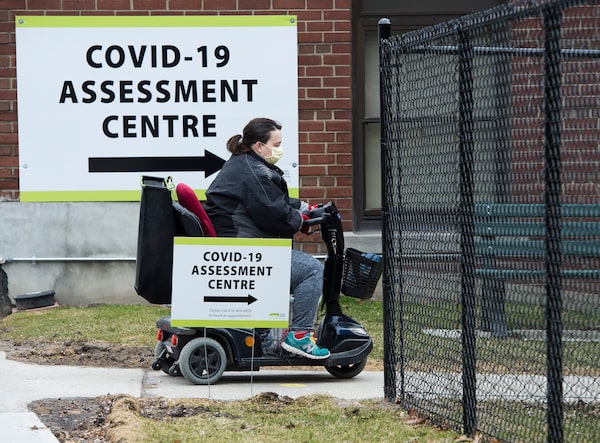
A woman arrives at the COVID-19 assessment centre at the Michael Garron Hospital in Toronto on March 24, 2020.Nathan Denette/The Canadian Press
“It’s about 50-50 now,” Dr. Howard Njoo, Canada’s Deputy Chief Public Health Officer said on Tuesday – meaning roughly half of the 2,500-plus Canadians with COVID-19 acquired the virus in other countries, and the other half were infected here in Canada.
“And remember,” Dr. Njoo added. “That exposure happened 2-3 weeks ago.”
We’re at a proverbial tipping point.
With international travel shut down, and the U.S. border closed down, the travel cases are going to dry up over the next few weeks. But the community-acquired cases are going to continue to grow.
This is a bona fide Canadian epidemic now.
We have to stop deluding ourselves into thinking this pandemic is only going to have a substantial impact on China, Italy or the U.S., or that Canada’s outbreak is just about snowbirds returning from Florida or backpackers coming back from Italy.
We also have to dispense with the “whataboutism” – what if we had closed borders sooner, what if we had embraced social distancing measures sooner? Hindsight is always 20/20. There will be plenty of time later for the obligatory retrospective, self-flagellating, public inquiry.
Right now, we need to focus on the make-or-break weeks ahead.
Coronavirus has a foothold in communities across Canada now. We can’t stop it from spreading, but we can slow it down.
Restrictive public health measures, such as shutting down non-essential businesses, staying home and keeping a physical distance of two metres between people, albeit difficult, are more important than ever.
When people like U.S. President Donald Trump talk about the cure being worse than the disease, and bemoan the economic impact of the shutdowns, they are exhibiting a disturbing level of crassness and shortsightedness.
Limiting social contact is designed to slow infections. It’s not a permanent measure, but it can’t be a fleeting one either.
The now familiar term “flattening the curve” means spreading out infections over a longer period of time so hospitals can cope with the influx of seriously ill patients.
Once you have more critically ill patients than ventilators or ICU beds, you cannot proffer proper care and the mortality rate shoots up. This is the horrific scenario now unfolding in Italy.
It’s barely been a week since U.S. states started imposing restrictive “shelter in place” measures. Some Canadian provinces started earlier – Quebec was first to declare a state of emergency on March 14 - giving them a leg up.
But it’s still much too soon to talk about getting everyone back to work and play – and spreading their germs more broadly.
When President Trump and some conservative economists talk about “herd immunity” what they mean is letting the coronavirus run wild, everyone being infected, and survivors having immunity, like a global chickenpox party.
What they are proposing is essentially “culling the herd,” letting large numbers of people – principally the frail elderly, people with disabilities and chronic illnesses, and those living in poverty or homelessness – die.
Ethics aside, we’re not talking insignificant numbers either. With the U.S. on course to be the hardest hit country on earth by coronavirus, epidemiologists are projecting the possibility of a million deaths or more in the U.S. (Up to 100,000 in Canada.)
Why wouldn’t we do everything in our power to blunt this dystopian outcome, even if it does cause some economic pain?
This is not to suggest that economics don’t matter. Of course they do. The number one determinant of health is income.
It’s hard to be healthy if you’re poor. That’s why stimulus packages are important.
But every bit of taxpayer money – and Ottawa has committed $82-billion to date – should be spent helping workers who need income to eat and pay their rent, on treating the sick, on ensuring our health and social welfare system can provide all the help necessary.
It shouldn’t be about bailing out corporations and mollifying billionaires, but keeping people alive, and safe.
We’ll have plenty of time to figure out how to rebuild the economy later and hopefully we will create a model that is more equitable, fair and sustainable.
But, for now, we need to focus on stopping, or at least slowing, the pandemic. Before re-building communities, before getting people back to work, we need to, first and foremost, tackle community spread of coronavirus.
It’s no time for half-measures or for abandoning the fight in the name of economic barbarism.
 André Picard
André Picard